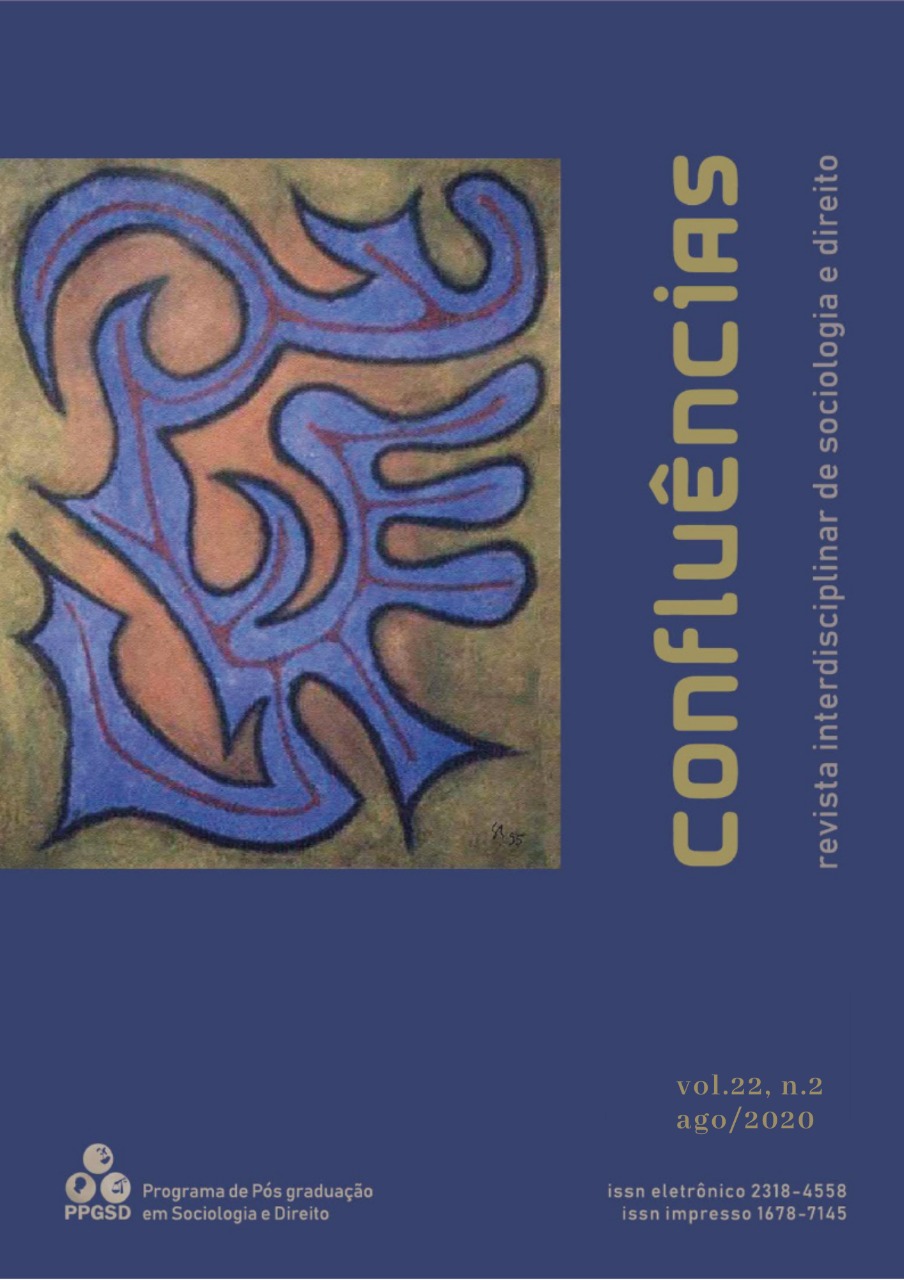ISOLATION AND INFORMATION: Collective memory and identity formation in times of coronavirus through the media
DOI:
https://doi.org/10.22409/conflu.v22i2.42956Keywords:
Isolation. Information. Identity Formation.Abstract
This article aims to reflect on the formation of identity in times of Coronavirus, with emphasis on two phenomena that are immediate results of this situation: isolation and media information, thought here in connection. Theoretical and methodological discussions take place from Social Psychology, where the concept of collective memory will be applied to fragments of narratives available on social networks, newspapers and TV on the theme of Coronavirus. The proposal is based on the experience of isolation and the crossing of media information from representatives of four different discursive spheres: economic, scientific, political and popular, to analyze the perception of the health crisis that now presents itself in opposition to the fragments of collective memory present in these same speeches. It seeks to recognize the effects of isolation in connection with the transmission of simultaneous information, in a virtual space-time relationship that changes thoughts and behaviors in everyday space-time-home; interferes in global economies and, we suspect, will interfere in the formation of social identity, because if we admit that memory forms identity, we can ask the following question: what will this current collective memory, of transition, represent in the formation of Brazilian and global social identity? Changes in the world of work, education, science and social, political, governmental, and economic relations that were expected to develop in at least a decade as an expectation (memory of the future) by specialists, start to occur in just over weeks. Nowadays our space-time has suffered a huge collapse. How does isolation, in a context of networked information and dizzying changes, affect this formation of identity? Discussing this set of phenomena and how it interferes with mental, economic and social health is our objective and, we believe, it contributes to the mobilization of the scientific network to think and produce, intellectually, about the scenario we are living in and that reflect on coping with COVID -19, in Brazil.
Downloads
References
ABRAMO, Perseu. Padrões de manipulação na grande imprensa / Perseu Abramo; com
colaborações de Laura Caprigliole ... [et al.]. – 2. ed. – São Paulo: Editora Fundação Perseu Abramo, 2016.
ALVES, Rafael. Jornal do Estado de Minas Gerais. Disponível em: em.com.br Acesso: 16/05/2020. Atualizado em 09/05/2020.
BERGER, Peter; LUCKMANN, T. A construção social da realidade. Petrópolis, RJ: Vozes, 1971.
BOLLE, Monica de. Vivemos um problema de coletividade, não um problema individual, concedidas a Isabelle Moreira Lima, Laura Capethuchmik e Willian Vieira. Gama. 2020 . Disponível em: Gamarevista.com.br. Acesso: 29 de março de 2020.
DAMATTA, Roberto. O que faz o brasil, Brasil? Rio de Janeiro: Rocco, 1986
HALBWACHS, Maurice. A memória coletiva. São Paulo: Vértice, Revista dos Tribunais, 1990.
IAMARINO, Atila. entrevista transmitida ao vivo em 30 de março de 2020 no Roda Viva, pela jornalista Vera Magalhães, onde o biólogo e divulgador científico “Atila Iamarino, doutor em microbiologia pela USP e fundador da maior rede de blogs de ciência do país, afirma: “se não forem tomadas as devidas providências, o mundo vai enfrentar um cenário de apocalipse.” (RODA VIVA, 2020) Disponível em: youtube.com .Acesso: 14/05/2020
MORI, Nerli. N. R. Memória e identidade: a travessia de velhos professores através de suas narrativas orais. Maringá: EDUEM, 1998.
PACHECO, Rafael. M. Os Xetá e suas histórias: memória, estética, luta desde o exílio. (Dissertação de Mestrado). Departamento de Antropologia PPA- UFPR, 2018.
PRADO, Franciele. M. Fazendo antropologia na rua: a gênese da produção social da marginalidade entre os “flanelinhas”. Universidade Estadual de Maringá. (Dissertação de Mestrado). Programa de Pós-Graduação em Ciências Sociais. 2016.
RIBEIRO. Darcy. Os índios e a civilização. 1 ed. São Paulo: Círculo do Livro, 1989.
ROMÃO, José Eustáquio; GADOTTI, Moacir PAULO FREIRE E AMÍLCAR CABRAL: A descolonização das mentes. São Paulo: Editora e Livraria Instituto Paulo Freire, 2012.
SANTOS, Boaventura de Souza. A Cruel Padagogia do Vírus. Coimbra: Almedina, 2020.
SILVA. Maria Angelita da. Vulnerabilidade na Infância e Adolescência e as Políticas Públicas de Intervenção. Maringá PR: NEAD/UNICESUMAR, 2017.
SILVA, Maria Angelita da. Memória e identidade do Povo Xetá: narrativas visuais e memória coletiva no quadro da dispersão. 2019. 269 f. Tese (Doutorado em Educação). Universidade Estadual de Maringá, Maringá PR, 2019.
SOUZA, Ana Daniela de. A IDENTIDADE FORJADA PELA MÍDIA: Expressões cotidianas reveladas por jovens das classes populares emroteiros pelos metrôs de São Paulo. 2007. 179 f.. Tese (Doutorado em Serviço Social). Universidade Estadual Paulista"Júlio de Mesquita Filho". FRANCA, 2007.







